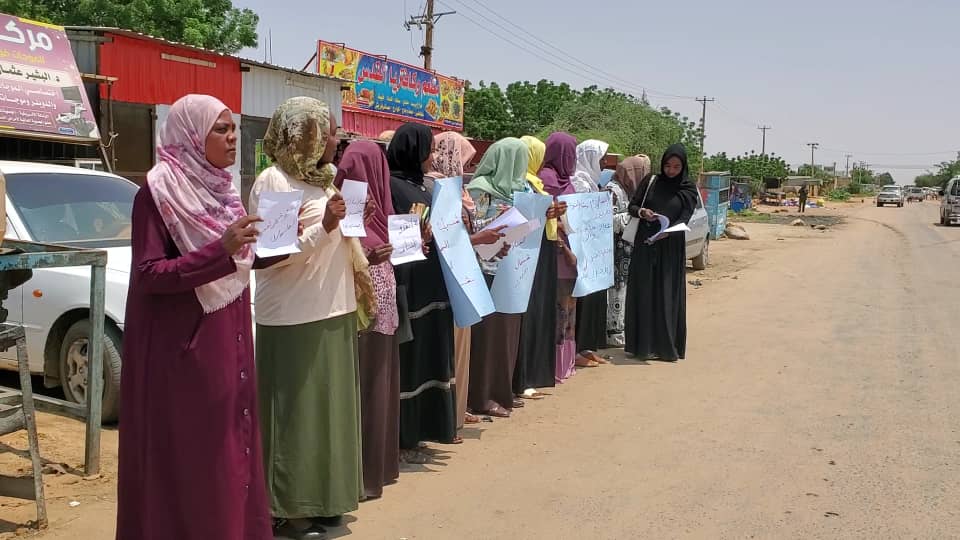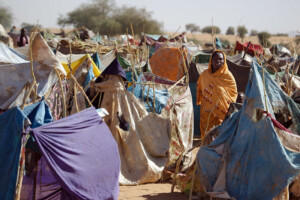Women’s vigil in North Darfur capital decries healthcare collapse

Vigil by women activists in El Fasher on Thursday (Photo: RD)
Women’s activists organised a vigil in the North Darfur capital, El Fasher, on Thursday to protest the deteriorating healthcare conditions, and what they called the failure of the Ministry of Health and the state government to support the Specialised Maternity Hospital. Shortages of medicines and equipment at hospitals has become a country-wide crisis, as logistics, supply, and power outages stress facilities beyond their limits.
The participants in Thursday’s vigil told Radio Dabanga of their dissatisfaction at the facilities at the specialised obstetrics and gynaecology hospital, which is the main reference hospital, and the only one of its kind in the state. They lament that “the hospital lacks even the simplest equipment to provide treatment in the fields of obstetrics and gynaecology.” they say, “which has resulted in the deaths of a large number of mothers and newborns”.
The medical staff lack essentials such as surgical gloves and blood for transfusion, the activists say. The electricity supply is subject to frequent outages, and “for the past four months, the hospital has relied entirely on initiatives by public volunteers and the support committee”.
The vigil appealed to the state government and the Ministry of Health to pay urgent attention to the conditions at the hospital, as they fear ”the situation may collapse”.
The protesters decried the murders, rapes, and kidnappings in North Darfur state, pointing to the deteriorating conditions of women in various fields. “Women are subject to continuous violations in the centres and neighbourhoods.”
Activist Asmaa El Nour, one of the participants in the vigil, told Radio Dabanga that the vigil demanded the provision of necessary medicines to save women’s lives, especially at the specialised hospital for obstetrics and gynaecology in El Fasher, and criticised the state health ministry’s failure in doing its part.
National crisis
Earlier this month, Dabanga reported that blood transfusion bags, anaesthesia, gauze, solutions, and suture threads are among the medical supplies that are in critically short supply in the South Darfur capital of Nyala, as medical facilities are swamped with an influx of conflict-related cases. Health care in South Kordofan is suffering from a shortage of medicines.
The Children’s Hospital in El Gedaref, eastern Sudan, recorded figures of 132 children who died as a result of a surge in malnutrition-related diseases. According to recent reports, there has been a marked increase in the number of disease cases and fatalities, notably within camps providing shelter to those uprooted by the conflict in Khartoum. From April to July, the Children’s Hospital documented a total of 365 malnutrition cases, which they state, translates to a 20 per cent mortality rate among afflicted children. The monthly death toll saw 33 casualties in April, followed by 41 in May, 24 in June, and another 34 in July.
Apart from massive logistical challenges to distribute vital equipment and medicines brought about by the war, a lack of fuel means that hospitals cannot always run generators to power equipment. As reported by Dabanga this week, a kidney failure patient died in Port Sudan, after a dialysis centre was struck by a power outage.
Compounded with the scarcity of essential medical supplies required to provide adequate care for over 360 patients, among whom at least 100 have been uprooted from Khartoum due to the destructive clashes that ravaged the capital’s healthcare infrastructure.











 and then
and then